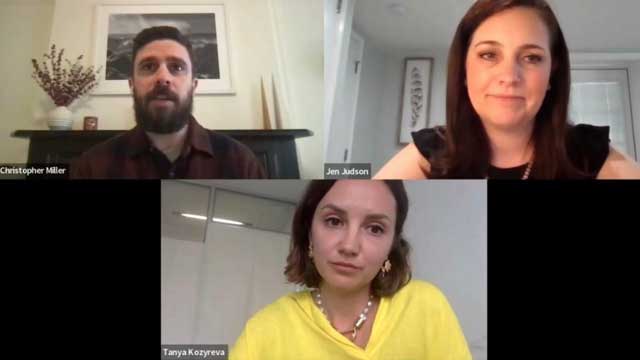Barren village foxholes under fire and Elon Musk’s Starlink internet system at work in the field gave two frontline journalists some of their many close-up views of Ukraine’s struggle to repel Russia’s full-scale assault that began on February 24.
Ukrainian journalist Tanya Kozyreva and Politico correspondent Christopher Miller described those experiences and more to illustrate the impact of the war and how news media there and abroad are covering it.
In a June 21 online discussion for the National Press Club moderated by NPC President Jen Judson, land warfare reporter for Defense News, Kozyreva and Miller appealed for the world not to forget what’s going on in Ukraine, as the conflict drags into its fifth month and political leaders and journalists in more comfortable places look to summer breaks.
“It’s very crucial for all the people of Ukraine that the whole world does not lose attention to this conflict,” Kozyreva said, “because for Ukrainians, it’s ongoing. It’s not stopping.”
Kozyreva recalled visiting a frontline Ukrainian position where troops had just a few weapons, contrary to the impression that people in the West might get as they see constant news reports about the United States and European nations sending billions of dollars of armaments and supplies. Two weeks later, she learned that some of the soldiers she spoke with had been killed in the fighting. “It was really intense hours,” she said of her time on the front lines.
The Committee to Protect Journalists has recorded 15 journalists and media workers killed this year in Ukraine. “Underestimating the threat is one of the reasons why so many journalists died already in this conflict, because sometimes you’ll get used to this threat and you underestimate it," Kozyreva said.
Miller has lived most of the past 12 years in Ukraine, though he returns to his home in New York City from time to time for a break. As he reported from the war’s front on strategy and weapons systems – soldiers say they need “more of everything” -- he also kept an eye out for the Starlink system, which uses satellites to provide high-speed internet connection to places where regular connections aren’t available. He produced a story on that with colleagues in five cities across two continents.
Miller has also seen “incredibly talented Ukrainian journalists that are doing really great work," he said citing two independent Ukrainian media outlets that publish coverage in English -- Ukrainska Pravda (Ukrainian Truth) and The New Voice of Ukraine.
“Following them is not only going to be beneficial to the western media world, but connecting with them to potentially collaborate or … ensure that Ukrainian voices are in our reporting would be a great way of elevating everybody’s work,” Miller said.
Ukrainian media are struggling since the war broke out, despite an upsurge in viewership and readership because of the conflict, Kozyreva said. Those that relied on advertising revenue before saw their advertiser base evaporate, and those that received grants or audience support are suffering because donors are more focused on military or humanitarian causes.
Both journalists said Western media have done a good job of covering the war’s key battles and the Russian atrocities that have been revealed in suburbs of Kyiv like Bucha and Borodyanka.
Kozyreva advised more attention to the plight of Ukrainian civilians living under siege and to the “filtration camps” that Russians are using to screen – and allegedly often abuse – Ukrainians forced to flee to Russian-held territory, such as those who tried to escape the assault on Mariupol.
Miller noted the dearth of information from Russia, because the government has shut down independent media there and forced out foreign journalists. “We don’t know a lot about what is happening inside of Russia,” he said.
Viola Gienger, The National Press Club





